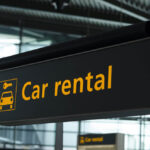It’s a great feeling when you go to rent a car for your personal needs. Travel is much easier if you have a rental car for your personal errands. However, renting a car might be perplexing. First, you would need rental car insurance. Then you will be presented with a plethora of additional insurance options. You may have to add these insurance options to your rental.
If you already have auto insurance for your car, it will cover rental cars as well. You can still rent a car if you do not already have auto insurance. And, with a few exceptions, most drivers will not be required to produce proof of insurance while renting a car.
You can rent a car even if you don’t have car insurance because you don’t own a car. Suppose you use your credit card to pay for the rental. In that case, many credit card companies offer rental car insurance, so even if you don’t have auto insurance, you may not need to pay for the rental company’s insurance alternatives.
Different Types of Rental Car Insurance
You should be aware of your alternatives if you get extra insurance from the car rental provider. When you hire a car, it will come with the bare minimum of liability insurance, which may not be enough to cover you in the event of an accident, and it will not cover any damage to the rental car itself. Most major car rental companies provide a variety of insurance add-ons.
Collision Damage Waiver
The collision damage waiver (CDW), often known as a loss damage waiver (LDW), is not insurance. It’s a fee-based waiver that will assist in covering the costs of your rental car. It’s comparable to how collision and comprehensive coverage function in a typical auto policy in certain aspects. If you do not purchase it, you will most likely be held responsible if your rental car is stolen, damaged, or towed.
Supplemental Liability Protection
Supplemental liability protection is an addition to the rental car’s existing liability coverage. It effectively raises the limits of your liability coverage, so it’s an excellent item to acquire if you’re concerned that your present limits are insufficient to cover any damage or injuries caused by an accident. It is normally a daily fee, and the price varies based on where you get a car.
Personal Accident Insurance
You generally don’t need to add this to your rental car if you have health insurance.
Personal Effects Coverage
This covers the price of replacing any personal goods taken from your rental car. If you have renters’ or homeowners’ insurance, you are probably already insured if your belongings are taken, so you don’t need to add this coverage.
Rental Car Insurance on Your Car Insurance
If you have your auto insurance, you probably don’t need extra insurance for your rental car. To be sure, check your policy or call your insurer, but most policies expand the definition of your “covered car” to any car you rent. That means the same restrictions and deductibles that apply to your policy will apply to your rental car as well. Your liability policy, just like driving your car, pays the costs if you harm someone or damage someone’s property while driving your rental car, and your comprehensive and collision insurance covers damage to your rental car.

You are unlikely to be required to produce insurance proof when picking up your rental car. This is an exception if you pay for the rental car with a debit card rather than a credit card. In that instance, the rental business may request proof of insurance before allowing you to hire a car.
Keep your insurance card on hand in case of an emergency.
If you have rental car insurance through your own credit card, it can function as supplementary or supplemental coverage. If you believe that the coverage provided by your car insurance and credit card is adequate — and it most likely is — there is no need to obtain additional insurance from the rental car business.
Car Rental with No Personal Car Insurance
You can rent a car even if you don’t own a car or have car insurance. In fact, not having a vehicle is one of the most prevalent reasons for renting a car in the first place. As a first step, determine if your credit card has rental car coverage. Many credit cards provide coverage if your rental car is damaged or stolen, as long as you paid for it with that card.
However, the insurance provided by your credit card may be limited, and you may not be allowed to use it as your primary insurance on your rental car, depending on your card and where you rent a car. In such situations, you may need to obtain at least a portion of the agency’s add-on insurance.
It would be a good idea to look into non-owner car insurance if you always rent a car and do not own one. If you have non-owner car insurance, you will not have to buy an expensive policy from the agency all the time to protect yourself.
What Is Non-owner Car Insurance?
Non-owner car insurance is a policy designed for persons who often drive but do not own a car. Non-owner car insurance is much more limited than a standard car insurance policy. It typically only includes liability coverage, though you might be able to add personal injury protection (PIP). PIP would cover your medical expenses or lost wages following an accident. At the same time, uninsured/underinsured motorist coverage will protect you if you have an accident with an uninsured driver.

How to Get the Right Rental Car Insurance?
As with all car insurance, start by comparing quotes from several insurance providers. This ensures you get a good deal on your car insurance. Contact a licensed insurance agent. If you need multiple car insurance quotes in less than 10 minutes, check out the way.com app or website. We only require your basic information to research different uninsured motorist coverage options for you. Then you can choose your policy and benefit from the protection it provides.

Sara Sam may not look like your typical car and finance expert, but don’t let that fool you. With over four years of experience in the industry, she knows all the ins and outs of cars, car insurance, and refinancing. You can trust Sara to help you navigate the often-confusing world of automobiles and financing.














